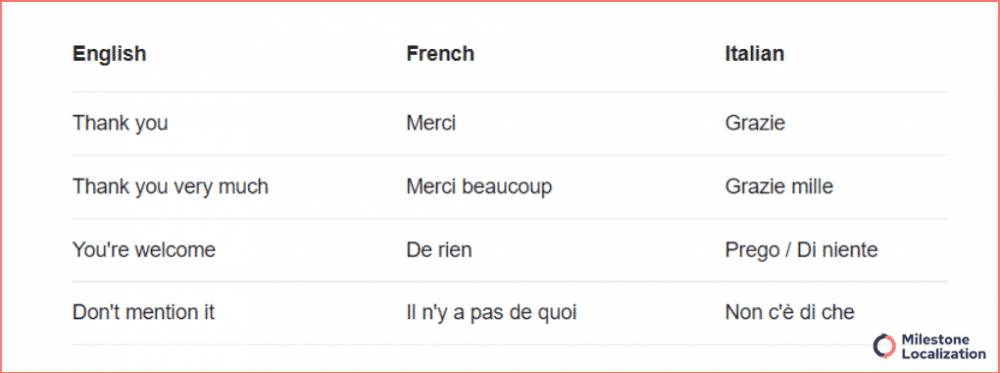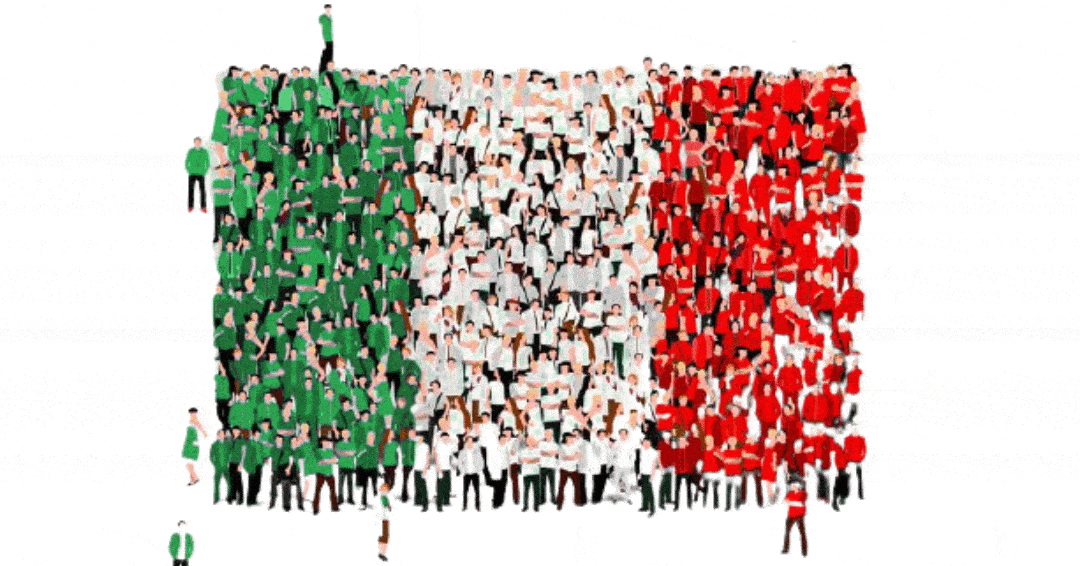Italian vs French languages: Both are often associated with passion, love, good food, and beauty. What’s more, these two European languages have a common origin – they are descendants of Latin, the language of the Great Roman Empire.

In today’s blog, this is what we are going to explore. I promise you that by the end of this blog you will have a precise idea of how different (and similar) French and Italian actually are.
Italian vs French: Geographical Presence and Number of Speakers
Before we dive into the fascinating world of linguistics, let’s take a more general look at these two languages. As we already know, both Italian and French originate from Latin which is why they share a lot in common (or at least so it seems).
Where is the French language Spoken?
French, considered to be the 6th most spoken language in the world after English, Mandarin Chinese, Spanish, and Arabic.
Indeed, statistics show that in the period 2014-2018 the number of French speakers has increased by nearly 10%. Today there are around 300 million native French speakers in the world.

French is an official language in 29 countries: France, Belgium, Benin, Burkina Faso, Burundi, Cameroon, Canada, Chad, Ivory Coast, the Democratic Republic of the Congo, Djibouti, Equatorial Guinea, Haiti, Luxembourg, Madagascar, Mali, Monaco, Niger, Rwanda, Senegal, Seychelles, Switzerland, Togo, and Vanuatu.
What’s more, French has the status of an international language and besides English, this is the most commonly used language in European diplomacy.
It is an official language of the UN, the European Union, and the African Union.
Moreover, French continues to expand. It has taken over the world and now it’s about to do the same with the Internet. French is the 4th most used language on World Wide Web and is used by over 4 billion users.
Where is the Italian Langauge spoken?
Italian, on the other hand, known as the language of music – I’m sure everyone has heard of Italian opera. However, its’ influence exceeds the realms of music and art.
Italian is an official language of the European Organization for Security and Co-operation as well as one of the working languages of the European Council.
In addition, Italian is the official language of Italy, San Marino, Switzerland, and the Vatican City as well as in some parts of Croatia and Slovenia.
The list of countries with sizeable Italian-speaking populations is rather long, so here are just a tiny part of the countries where Italian is spoken: Argentina, Germany, Israel, Libya, Australia, Belgium, United Arab Emirates, the United States, Egypt, Philippines, etc.

Overall, there are 67 million Italian native speakers in Europe and 58 million of them live in Italy. The total number of Italian speakers worldwide is approximately 85 million people.
Check Out: GLOBAL LANGUAGE FACTS
Italian vs French: Origins
Since Italian and French stem from Latin, they both belong to the Romance language family. At the time of the collapse of the Roman Empire, various dialects of Vulgar Latin started to form all over the territory of the Roman Empire.
These dialects have developed into the languages we call today Portuguese, Romanian, Spanish, and, of course, Italian and French.
All these languages are to a certain extent mutually intelligible due to their common origins. However, you should take this with a pinch of salt because, despite their common ancestor, each of these languages has developed independently.
[bctt tweet=”All these languages are to a certain extent mutually intelligible due to their common origins. However, you should take this with a pinch of salt because, despite their common ancestor, each of these languages has developed independently.”]
In the case of the French, it has expanded to new territories and continents. This geographical distance and the lack of connection between these regions have led to considerable differences even between the varieties of the same language.
The French spoken in France, Congo, and Canada might stem from Vulgar Latin, however, the physical distance between these countries has resulted in three different varieties of the same language.
What’s more, different historical periods and events have influenced the development of French and Italian. For example, Standard Italian based on its Florentine dialect which dates back to the 12th and 13th century Tuscan poetry.
Modern French, on the other hand, based on the Francien dialect and it was during the 14th-17th century when the standardization of the French language began6.
Clearly, French and Italian are two independently developing languages and as such we cannot expect them to be extremely similar despite their common ancestor.
Comparison of Italian and French
Alphabet and pronunciation
When it comes to alphabet and pronunciation, French and Italian differ considerably.
While French is notorious for its silent letters, many vowels, and special letter combination, Italian is much more consistent when it comes to its pronunciation.
Since it is a phonetic language, in Italian you write the words the same way you pronounce them while in French even native speakers might not know how to spell a particular word if they have never heard it before.
[bctt tweet=”Since it is a phonetic language, in Italian you write the words the same way you pronounce them while in French even native speakers might not know how to spell a particular word if they have never heard it before.”]
Although both the Italian and the French alphabets based on the Latin script, their adaptations are quite different. For instance, French has 26 letters while Italian has only 21.
French pronunciation

Italian pronunciation:

Connect With Italian & French Customers In Their Native Languages.
Milestone helps you seamlessly translate content & localize your website, products, and services for more reach and better conversions,
In terms of vowel sounds, Italian has only 7 which is not much compared to the 17 vowel sounds in French, including the infamous “nasal” vowels who are among the greatest stumbling rocks for language learners.
When it comes to consonants, it seems like French and Italian do not differ so much except for the French /r/ sound which pronounced at the back of the throat.
Overall, French and Italian are very melodic languages, however, they are rather divergent in terms of their pronunciation.
Italian vs French language: Grammar
Grammar is one of the hardest aspects of learning any language. Both French and Italian known for being rather difficult languages grammar-wise.
Generally, it could be said that Italian tends to adhere to strict rules more often than French.
For instance, when it comes to gendered nouns, in French there is no way to differentiate between feminine and masculine nouns so you don’t have a choice but to learn it by heart.
In Italian, things are pretty simple: feminine nouns end with “a” while masculine with “o”.
In terms of articles, French is much easier since there are articles for singular and plural form which change based on the gender of the noun (feminine or masculine). Italian the form of the articles depends on the number, gender, and the initial letter of the word – depending on whether the word starts with a vowel or a consonant, uses different articles.
As you can see there are no great dissimilarities between French and Italian. Of course, there are subtle features that, however, make a big difference.
For example, in French, the direct object pronouns (le, la, les) are situated before the verb (Je veux la voir, meaning I want to see her) while in Italian they are attached to the end of the verb (Voglio vederla).
Overall, both French and Italian have their own particularities. Thus, it is pointless to keep trying to find out which one has more complicated grammar.
Still, we could conclude that Italian is more consistent when it comes to grammatical rules (which is not always true, but in most cases) while French has more “special cases” and exceptions to which one should pay close attention.
Italian vs French: Vocabulary

Since both French and Italian originate from Vulgar Latin, it is expected that should have a lot in common in terms of vocabulary.
However, how much in common do they have?
You will be surprised to learn that according to linguists 89% of the Italian and French words are similar which, needless to say, is quite an astonishing number.
Let’s have a more practice example. Below you have the extract same sentence in French and then in Italian:
In French:
Tous les êtres humains naissent libres et égaux en dignité et en droits. Ils sont doués de raison et de conscience et doivent agir les uns envers les autres dans un esprit de fraternité.
In Italian:
Tutti gli esseri umani nascono liberi ed eguali in dignità e diritti. Essi sono dotati di ragione e di coscienza e devono agire gli uni verso gli altri in spirito di fratellanza.
These two passages clearly show how similar the vocabulary of these languages is. While it would be an overstatement to say that these texts are exactly the same, we can clearly see how similar most of the words are.
[bctt tweet=”These two passages clearly show how similar the vocabulary of these languages is. While it would be an overstatement to say that these texts are exactly the same, we can clearly see how similar most of the words are.”]
Indeed, a French speaker would be able to understand the gist of the Italian excerpt without any previous knowledge of Italian.
Still, you should keep in mind that despite these conspicuous, but rather superficial similarities, French and Italian have developed independently. This, in turn, has had inevitably a result on their vocabulary.
For instance, French is hugely influenced by the Frankish (a Germanic language) and the Gaulish (a Celtic one) languages and an astonishing amount of loanwords exist even today. These loanwords, however, do not exist in the Italian language.
Italian vs French: Culture
Generally, we could say that Italy represents the past of the Great Roman Empire while France symbolizes the modern, new era we live in today.
Nevertheless, French and Italian people have a very distinct way of life.

Most of the time Italian people are regarded as laud, chaotic, friendly, and emotional while French people tend to adhere to the rules and are rather tranquil or even indifferent.
Moreover, both Italian and French people have devoted Catholics, however, Italian people tend to be more family-oriented.
What’s more, it is a well-known fact that the cuisine is central to the cultures of these countries. Yet, this is the only similarity.
While Italian people are best known for their love and passion for pizza and pasta, French people tend to enjoy a glass of good wine with cheese.

A common greeting in both countries is kissing on the cheeks. In Italy, people usually kiss each other from right to left which, surprisingly or not, is just the opposite of what French people do.
All in all, culture appears to be yet another aspect in which France and Italy tend to diverge considerably.
Learning Italian and French

Without a doubt, both Italian and French are well-known for their melodic sound and, indeed, their beauty is why many people choose to learn them.
French is the 2nd most studied language in the world – around 125 million people study French. What’s more, it is among the most commonly taught languages at school all over the world.
Italian, on the other hand, is studied by around 2 million people. Moreover, it is not as popular as French and not many schools offer it as a school subject. But if you do decide to learn this beautiful language, you will discover many new emotions. You will be able to spend time in Italy, fully immersed in the atmosphere of the cities, the culture of their inhabitants, and the local nature. You will be able to spend your Walking Holidays in Italy enjoying the views of Lake Garda as well as the Dolomites and understanding the locals will give your trip a special charm.
Are French and Italian mutually intelligible?
In terms of mutual intelligibility, French and Italian speakers cannot understand each other very well when speaking. This is due to the greater differences in regard to their sound inventories, i.e. their pronunciation.
On the other hand, in written form, it is much easier for French and Italian people to notice the similarities in the vocabulary. Thus, it is easier for them to grasp the general idea of the text.
Overall, learning French for Italian speakers and vice versa might seem easy. Still, you should take into consideration that one should be very careful when studying the language due to their subtle similarity.
As for English speakers, Italian might be a little harder than French.
In English, nearly 29% of the vocabulary stems from either French or Latin which is greatly beneficial for every French-language learner. Italian, on the contrary, is quite different from English pronunciation and grammar-wise.
Check Out: LANGUAGE INFOGRAPHIC GALLERY
To conclude
Comparing French and Italian is a quite difficult task since they are very similar, yet subtly different.
While these languages have a lot in common, they have developed on their own which has led to significant differences.
As we saw, the greatest similarity between them is the vocabulary, while pronunciation seems to be the greatest difference.
Regardless of their differences and similarities, Italian and French remain among the most beautiful languages in the world!
Connect With Italian & French Customers In Their Native Languages.
Milestone helps you seamlessly translate content & localize your website, products, and services for more reach, and better conversions,




